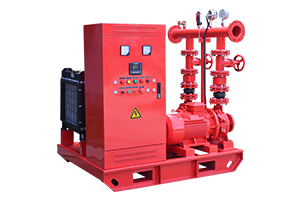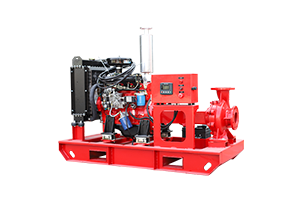Why is the Diesel Engine Fire Pump Very Hot After Starting for a While?
Introduction: Diesel engine fire pumps play a critical role in fire safety systems, ensuring the availability of water pressure to extinguish fires efficiently. However, it is not uncommon for these pumps to become extremely hot shortly after starting. In this essay, we will explore the reasons behind the high temperature of diesel engine fire pumps and discuss the factors that contribute to this phenomenon.
Paragraph 1: Combustion Process The primary reason for the high temperature of a diesel engine fire pump lies in its combustion process. Diesel engines utilize compression ignition, meaning the fuel ignites as a result of the heat generated by the compression of air within the engine cylinders. This combustion process is highly efficient, but it also generates significant amounts of heat as a byproduct. As a result, the engine components, including the cylinders, pistons, and cylinder heads, become hot during operation.
Paragraph 2: Friction and Mechanical Energy Another factor contributing to the high temperature of diesel engine fire pumps is the presence of mechanical components that generate friction. Diesel engines comprise various moving parts, such as pistons, crankshafts, and bearings, which require lubrication for smooth operation. Despite effective lubrication, some friction occurs, converting mechanical energy into heat. This heat contributes to the overall temperature rise within the engine.
Paragraph 3: Cooling System While diesel engines generate considerable heat, they also employ cooling systems to maintain optimal operating temperatures. These systems typically consist of a coolant, water pump, radiator, and a fan. The coolant absorbs heat from the engine components and circulates it to the radiator, where it dissipates into the surrounding air. However, during the initial moments after starting the fire pump, the cooling system may take some time to reach its full efficiency. This delay can result in a temporary increase in engine temperature.
Paragraph 4: High Power Output Fire pumps, including diesel engine fire pumps, are designed to deliver high power outputs to ensure effective firefighting capabilities. The high power requirements can cause the engine to work harder, thereby generating more heat. Since fire pump engines often operate under demanding conditions, such as when responding to emergencies, the increased workload contributes to the elevated temperature.
Paragraph 5: System Design and Maintenance The final factor influencing the high temperature of diesel engine fire pumps is the design and maintenance of the system. Proper system design considers factors such as adequate airflow, heat dissipation, and insulation to minimize excessive heat buildup. Routine maintenance, including regular cleaning of cooling system components, inspection of lubrication systems, and replacement of worn-out parts, is crucial to ensure optimal performance and prevent overheating.
Conclusion: The high temperature of diesel engine fire pumps shortly after starting can be attributed to various factors, including the combustion process, friction, delayed cooling system efficiency, high power output, and system design. Understanding these factors helps engineers and operators implement appropriate measures to mitigate overheating risks, ensuring the reliability and functionality of fire safety systems. By addressing these considerations, diesel engine fire pumps can continue to play a vital role in safeguarding lives and property during fire emergencies.
.jpg)






